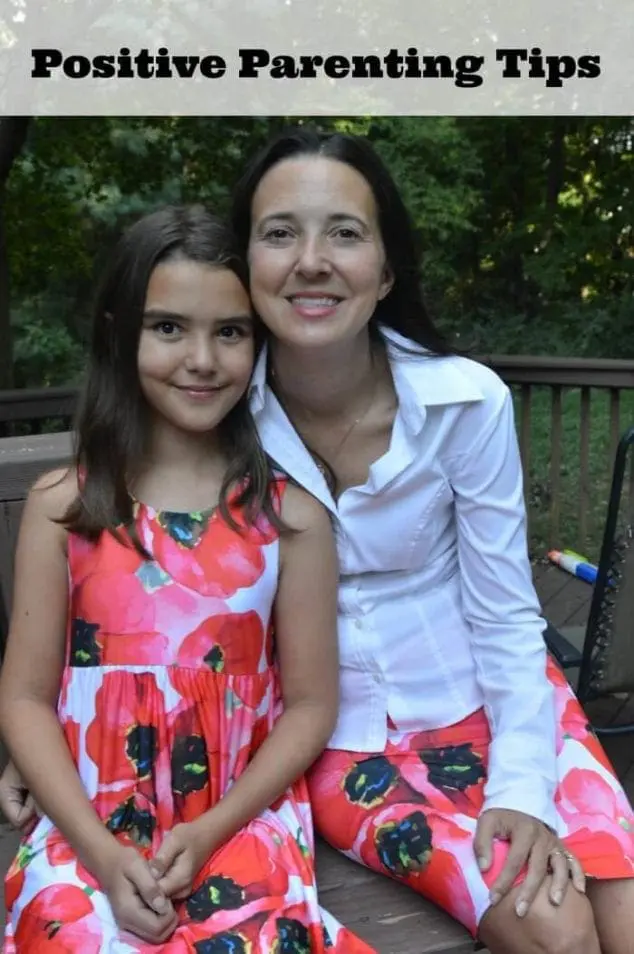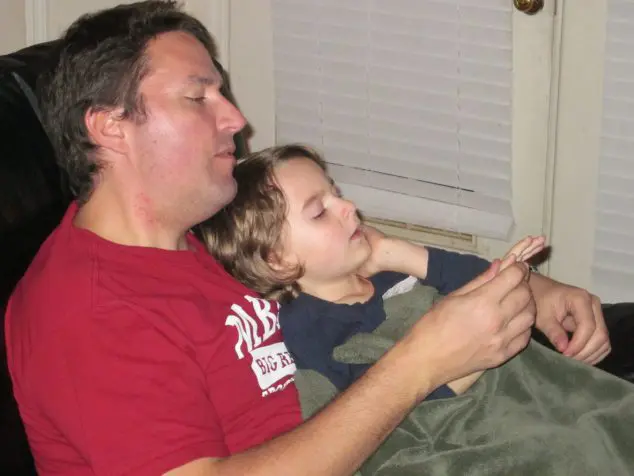Positive parenting is an approach that is built on mutual respect and treating your child as a person with feelings and the ability to think and make decisions. The positive parenting approach means saying good-bye to “because I said so” and instead, modeling good communication skills. The power of positive parenting is that if we show our children how to communicate effectively and handle conflict, they will learn how to do it for themselves. These five positive parenting tips will help you teach your child to be a better communicator and make home life easier and happier for all parties. I also follow up with some practical advice on positive parenting techniques to help you implement what you have learned.

5 Useful Positive Parenting Tips
Discover the incredible impact of positive parenting and learn practical tips to revolutionize your parenting style. This article explores strategies to effectively motivate and guide your children towards positive behavior. Avoid power struggles by not only providing clear expectations but also allowing children to know the reasons. This parenting style thinks of children as small adults that deserve the same respect and treatment you would give other adults just much more guidance. It relies on the parent-child bond and strong secure attachment so that children know we are asking what is best for them and naturally exhibit good behavior.
1. Talk to your child at their level
Get down on their level and talk to your child eye-to-eye. Not only does this show compassion and respect, it helps young children focus on what you’re saying. As an added bonus, it teaches them to look people in the eye when they talk to them. This positive attention and emotional connection will be returned in positive ways.
2. Enforce consequences
When your child understands that their actions have consequences, they’re more likely to think and act accordingly. There are good consequences, like complimenting someone and making their day. And bad consequences, like saying something mean that hurts someone’s feelings. All actions and words have a natural consequence and your child needs to understand that so they can use their words and actions better. Of these positive parenting tips, this is very useful to helping them chose their best behaviors all on their own.
The consequence should match the action so that your child can easily relate the two things. For instance, if they don’t pick up their toys that they were supposed to, the toys can be taken away for a bit. If they push another child, they can apologize and comfort the other child. They need to understand that having negative emotions can not be fixed through inappropriate behavior. Rather they should feel empowered to explore those emotions verbally with you.
As long as there are consequences for bad behavior, your child will start to learn better behavior. And likewise, if you catch them doing something good like sharing a toy and you compliment them, they will be more likely to repeat that behavior. Positive reinforcement build higher self-esteem and ensure more positive outcomes in the future.

3. Explain why
Telling your child to do something or to stop doing something isn’t enough. They don’t understand why they need to do or not do it. Once they understand there’s a good reason, they can accept what you’re telling them better. For instance, “don’t stand on the chair, you don’t have enough balance and you could fall and hurt yourself” is better than a authoritative parenting style “get down.” Knowing that you set limits because you care creates a positive relationship rather than one where they feel you snap at them for no reason.
The “why” is the teachable moment for your child so explain your decisions and requests when possible. This positive parenting tip will help produce responsible children that reason out their own actions before they do them.
4. Talk to them like a person
Don’t talk down to your child. Instead, use age-appropriate language when communicating with them and talk to them as you would an adult. If you’re running errands, tell them about where you’re going and why, what you need to get, and how long you think it will take. This allows them to feel part of what’s going on instead of just being dragged along. It will also allow them to predict what’s happening and what’s expected of them, eliminating tantrums over being confused.
5. Give children warnings
Of all the positive parenting tips, this one makes things so much easier for both the child and the parent. Instead of springing a change on them, give them a “heads up” type of warning to allow them to mentally prepare. “Dinner will be ready in 10 minutes so you will need to clean up your toys soon and go wash up.” “We need to leave soon so you have 5 more minutes to play.” Giving them information and time to adjust to what they need to do will help eliminate the tantrums that come with sudden change. These more realistic expectations will also save the parent a lot of frustration.
However, don’t give the warnings to far in advance. “We need to leave in 30 minutes,” means almost nothing to a small child. “We need to leave in 10 minutes, so please be ready to walk out the door soon,” will be more helpful. In other words, cater your communication to you child’s understanding of time and need for more detailed instructions.
Positive Parenting Advice
It’s fair to say we all want to do the best for our children, but sometimes you find yourself in that situation with your kids that’s breaking new ground and you have no reference point. You feel unsure how to respond. Other times you’ve been in the situation often, but wish you could find a better way to handle it. In this article I’m going to share seven positive parenting techniques that work to help you maintain your cool and keep your focus on positive parenting.
Approaching situations in a positive way with the right frame of mind is so powerful to achieving the positive outcomes we desire. Before we go into these successful tactics, let’s define the word “tactics”. Tactics simply means to “apply a strategy that achieves a certain objective”. An objective might be that you want your 5 year old to stop their temper tantrum and behave calmly. Another objective is to build a relationship with your children that is open and honest. Other parenting objectives might include overcoming low self-confidence or having them take pride and give their best in their school work. As parents, our jobs seem to be ever changing as our child grows and faces new challenges. These positive parenting techniques should help.
7 Positive Parenting Techniques To Help You Meet Parenting Challenges
1. Take 10
Take a few minutes to yourself if you feel the tension is too high. Go take some deep breaths and get some perspective on the situation. A few minutes may be what each of you needs to reset and calm down.
Sometimes kids get their knickers in a twist. It might be over homework, it might be something that happened at school , or it might be that they’re having adolescent mood swings. Rather than get sucked in, the best things to do is say, “Sorry, I can’t talk to you when you speak to me like that” and leave the room. You’ll find it’s a lot easier for you to leave the room than to get them to go to their room. If you leave there’s no tantrum. You’ve told them you don’t like their behavior and now they have the space to think about their behavior and come back into balance.
What’s great is that if they have ticked you off, you get time-out to think about your next move. Doing this has saved me from boiling over more than once! Try it and see how you get on. Staying calm will help you make better parenting choices and think about how to address the root of the problem.
2. Lead Them
This is my favorite. I’m not a fan of dishing out punishment and the best way to avoid it is to involve the children (if its age appropriate to do so) in the discussions about what’s expected from them. If they have input into a solution or idea, they are much more likely to comply with what’s needed because they were part of the decision process. You may also want to read about the difference between discipline and punishment.
Here, you are leading them to choose what is right so they can exert their own personal power. Having conversations where they see the what the objective is and they get to help decide how things can get done and what they will be responsible for will help them learn to problem solve and develop a sense of responsibility. This is much better than having them misbehave and you then having to exert your force to get them to comply to a set of rules they didn’t even know existed.
3. Be Direct And Concise
When you have to correct your kids or give directions, keep it short and simple. Try to say what you need to say in 30 seconds or less, because if you start to lecture their little eyes will glaze over and they will switch off.
To do this effectively you can’t dwell on what went wrong. Just cut straight to what you expect or need to happen in the future. Here’s an example, “When we are driving in the car, I need to be able to focus on the road and driving safely. I expect you to try to get along with your sister and behave so that I don’t get distracted. Is that clear?” If you start talking about the teasing or the pinching the message of what you expect will get lost.
4. Be Aware
You have to pause and think about your children from time to time. Take a few minutes weekly to just stop and think “What do they need right now?”
If you think stop about the cause of their poor behavior, you might see it is a need for more direct attention from you. Or maybe it is a sign that they need more sleep each night. Or maybe they are just hungry. See if you can put your finger on what is causing their poor behavior and talk them about it to see if they can become self-aware and learn to express their needs.
On the other hand, what behaviors are they doing really well with that might need some encouragement or recognition? If they seem to be reading more often, maybe they need more books and to be notice for their efforts. Do they need some inspiration or materials for drawing? This is one of the positive parenting techniques I use when I am thinking about my children’s birthday or Christmas presents. I notice an area of life where they are showing interest or promise and I select something that will help them develop even more.
5. Don’t Judge
This is a tough one for many parents. We want to leap in and advise. We want to correct them and show them the “right way” when we feel they are wrong. However, whenever we do this, we risk alienating our children and we make it harder for them to learn things for themselves. It is a good idea to let them explore and figure things out on their own when possible. While, that doesn’t work in dangerous situations, it is best most of the time because we learn from failure. We learn to be resilient. We learn to try new techniques and we build new skills. Additionally, we learn why things don’t work. As Thomas Edison said about the invention of the lightbulb, “I haven’t failed — I’ve just found 10,000 that won’t work.”
The best method is to draw out of your kids all the information on whatever they tell you. Instead of correcting them immediately and telling them “the better way”, ask them why they did something. Ask them how they felt about it. Ask them if they think they would ever do it again. If you feel they are wrong, ask them if you can say what’s on your mind. If you have their permission to speak about what they said, they are more likely to listen.
6. Don’t Let It Build
When you notice your child doing something that bothers you, deal with it early. Don’t wait and then be explosive. Deal with things early and quickly while your frustration and anger can be easily controlled.
I once saw a boy continually pushing his sister over and the mother kept saying “Stop it…Stop it… Stop it…” Until eventually she shot out of her chair and smacked him. Had she got up the first time the child pushed his sister and moved him away from the sister, the mother wouldn’t have gotten so angry, the sister wouldn’t have been pushed repeatedly, and the boy would have learned his behavior was unacceptable immediately.
7. Share One-On-One Time
Build a routine with your children. Put some special time aside for you and them each week to do something nurturing together. Listen, talk, share stories and life together. It doesn’t have to be for hours, it can just be 15-30 minutes, but it will bring you closer together. It can be during snack time when they come home, a trip out to grab a slushie together, or a date to play cards together. Just something fun to you to enjoy together and be able to share experiences or concerns in a safe place that is all about them.
I hope you enjoy these seven positive parenting techniques that will help you keep build a solid foundation and respond appropriately when you hit any rough patches. Parenting is a challenge on occasion but buckle up and you’ll get through it with flying colors because it is one of the most special relationships you can have. Being a parent is truly a gift for which we s
The Power Of Positive Parenting Conclusion
Unlock your child’s hidden potential and help them develop resilience with these positive parenting tips. Take control of challenging parenting situations and create a peaceful home environment with the power of positive discipline. Learn effective techniques to set clear boundaries, promote self-discipline, and cultivate a strong parent-child connection while fostering your child’s growth and development.
The positive parenting tips will help children become well-behaved, learn to communicate better, understand what they need to know, and reduce outbursts of frustration. Simply put, treat your child as you would want someone to treat you, communicate on their level, and be clear about what your expectations are. Be sure to share your own positive parenting tips in the comments! Do you have any stories to share about your experience with putting positive parenting tips into practice? Which positive parenting techniques were most helpful to you?
Related Posts:
Parenting Tips for Toddlers To Reduce Frustration
Understanding Children’s Behavior Problems And The Best Discipline Response



Nichole says
Thanks for sharing! Today is my first day reading parenting blogs and I’m overwhelmed by all the support we have! Thank you again for sharing.
We have a 5 year old and 3 year old. We are adjusting to all day kindergarten and have had some learning opportunities around acting out once home. I feel we are exhausted from the day and try to respect a little down time and a snack when first getting home. At times this doesn’t help. When we are upset or out of line it is like talking to a wall however if we wait to talk through the situation it isn’t immediate. Struggling to figure out how to handle these little outbursts. Any thoughts or articles to help navigate would be appreciated.
Overall he is a great kid and often tries to please but not sure what to do when he gets upset and won’t listen as we try to talk through the negative action/behavior that he just displayed.
Scarlet says
Trying to avoid the tantrum through making sure he gets a healthy snack and some rest time is a great start. You may also want to set him to work doing some low key activity to help him keep his calm like reading a book or being read to. If that doesn’t work and he becomes unreasonable and won’t respond to you trying to talk him through it, it may be best to give him some time to calm down. Just say, “Since you are so upset, I will give you a few minutes to yourself to calm down and then we can try talking again”. Then give him some time to finish his meltdown either there or in his room while you remove yourself and go on about your business. Sometimes they just need to get it out and they need to have that non desirable behavior ignored so they can see you won’t bend to their will.
Priya says
Hey family focus blog,
Excellent article !! Well done , It is very interesting positive parenting tips! It helps me a lot .Thanks so much for sharing this article. keep up good work
Ashley Blegen says
Explaining why has always been one of the hardest things for me. I grew up with parents who never explained why, their reason was always “because I said so”. But because this was one of my biggest pet peeves as a child it is something I try and work on with my kids so they can understand why things are happening instead of just accepting that it is ok.
Scarlet says
I think explaining is always the way to go when possible. However, my children also understand that though I stop to explain things most of the time, occasionally, I may not have time or the situation may not allow for it. They know when I say, “Do it now”, not to argue or ask questions but that they can ask questions later if they want to.
Geert Verschaeve says
Thanks, this was interesting. It’s a hard equilibrium indeed. I’m personally a fan of positive reinforcement (so I give a lot of positive feedback when desired behavior is shown). But bad behavior is hard, especially when it’s with tantrums and yelling (on the child’s end). Sometimes, even though I try to talk like an adult, explain the why, try to find out what’s wrong, I’m not getting through. So I’m definitely going to give everything what you’re saying here a try!
Phil says
Thanks for sharing! Today is my first day reading parenting blogs and I’m overwhelmed by all the support we have! Thank you again for sharing these helpful positive parenting tips.
Zain Pricesoye says
Great tips for positive parenting! In today’s digital age, it’s crucial for parents to stay connected and informed. #ParentingSimplified
Jack says
These are awesome positive parenting approaches. Building strong parent-child relationships is the basis for all that we do. I love your all blog contents.
Giana says
Thanks for sharing such a helpful article on positive parenting! I really like the tip about talking to children at their level and explaining why you’re asking them to do something. It’s important to remember that they are still learning and developing, and they need our help to understand the world around them.